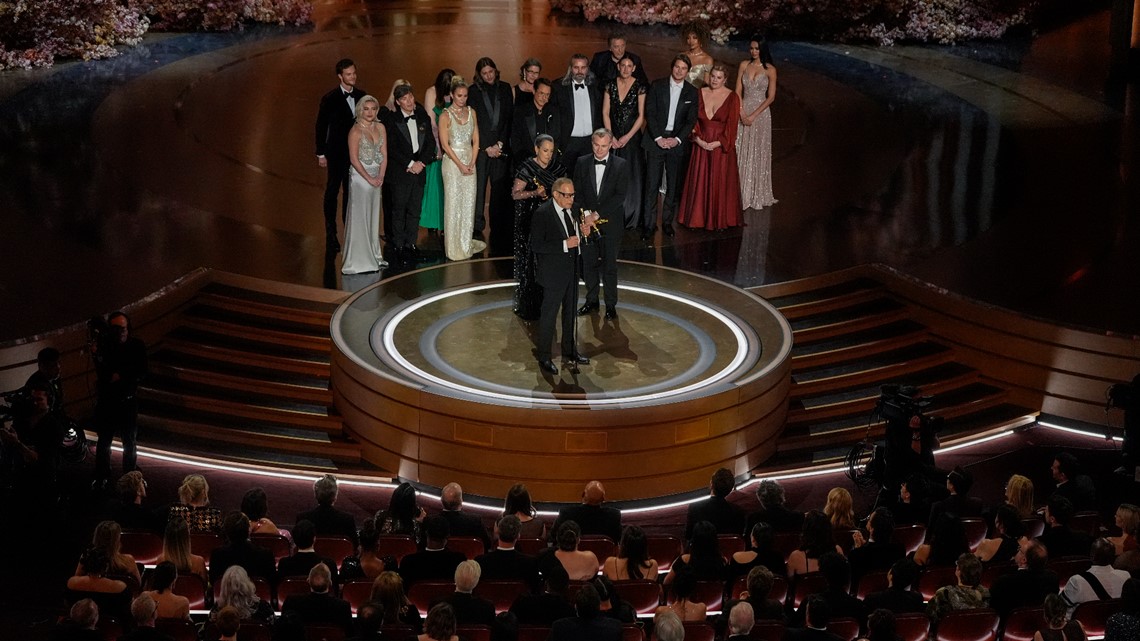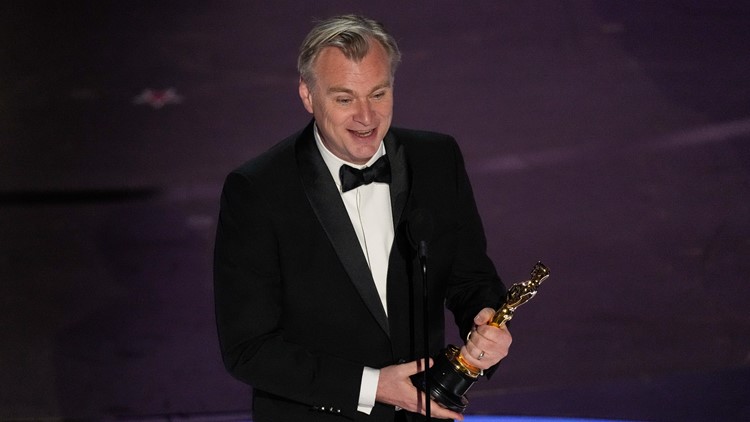SAN ANTONIO — For my money, the moment when Christopher Nolan’s “Oppenheimer” shifts gears from dutiful portrait of American history to white-knuckle thriller about world-ending weapons and the political squabbling of those overseeing them comes precisely 67 minutes in. It’s one of the movie’s many time jumps, and we’re whizzed back several years from a closed-doors meeting of the Atomic Energy Commission discussing the global arms race to a team of ambitious scientists examining a nuclear reactor that will prove key to that race starting in the first place.
It may be a simple cut, but because there’s nothing simple about how the 53-year-old Nolan makes movies, it’s also a cut that has made the hairs on my arms stand tall each of the several times I’ve watched “Oppenheimer.”
The first time, it was the ascension of Ludwig Göransson’s score that most excited me; the way his horns and strings engage in a dangerous tango mimicking a ticking clock (or a Geiger counter). The second time, the precision of Jennifer Lame’s editing pulled me even deeper into the urgency of the storytelling and the way two moments separated by years appeared to be in direct dialogue with each other.
On subsequent viewings – once I had gotten so reliably familiar with Nolan’s filmmaking that I was leaning into its chronological pivots instead of bumping into the guardrails – it was the sense that both “Oppenheimer” and Oppenheimer had soared beyond a point of no return. The same can be said for the wizards behind the camera as the ones being depicted onscreen: Eventually, it would only be a matter of time before great ambition resulted in great triumph. But it takes giving in to sheer forward momentum to get there, and such surrender paves the viewer’s way forward in the fateful creation of the atomic bomb in “Oppenheimer” just as it appears to have paved the film’s way to the peak of the Hollywood mountain on Sunday night, where it won seven Academy Awards.


To borrow from how his film paraphrases J. Robert Oppenheimer’s uncanny ability to envision that which has not yet tangibly materialized, Nolan has long been able to “hear the music” of the modern blockbuster (to say nothing of the many hundreds of millions of dollars pouring in from them). Now, in the form of multiple golden, eight-and-a-half-pound statuettes, he can hold it too.
With “Oppenheimer” the Academy has, for a second year in a row, awarded Best Picture to a widely popular film on a manifest destiny track to the top prize that came out many months before and remained at the forefront as many other contenders emerged. For several weeks it collapsed other contenders’ dreams like, well, collapsing layers of dreams as it captured top honors from the Screen Actors Guild, the Producers Guild, the Directors Guild and the BAFTAs. The last time that happened? 2012, with “Argo.”
Where did that awards momentum of “Oppenheimer” begin? Was it in January’s Golden Globes, where it received its first major best film prize? Was it in December, where it was consistently visible in critics circle consideration? Was it in July 2022, when a commanding first look ended with a proclamation about “the man who moved the earth” and we weren’t immediately sure if the words were about Oppenheimer or Nolan? The excitement (and millions of views) that bloomed in the wake of that teaser ensured that what was likely to be one of Nolan’s most conceptually grounded movies yet would nonetheless be received as emphatically as one of his genre mindbenders.
Or maybe it began 15 years ago. Like atomic particles bound together by energy, the three distinct timelines of “Oppenheimer” – the accounting of the bomb’s creation and use in the ‘40s; the fateful, carefully orchestrated destruction of his political credibility in the mid-’50s; and the political fallout suffered by Lewis Strauss in the decade’s twilight – unfold in hypnotizing and harmonious fashion, the events of different phases in Robert’s life simultaneously informing and being informed by what happened before and what is still to come. You could imagine a similar, circular chain of cosmic dominos being applied to Nolan’s own career, or at least going back to early 2009, when the Academy’s snubbing of “The Dark Knight” in Best Picture was met with outcry and eventually, indirectly, but quite obviously led to the return of an expanded field. (Not long after, Nolan’s “Inception” would become one of the few science-fiction movies of the 21st century to manage a Best Picture nod.)
Nolan’s trajectory has long been propelled by its own momentum. The ambition has escalated with each movie, even if the results weren’t always as satisfying as the previous effort. The trademarks have concretized, even as he skipped from genre to genre. The budgets have grown, as has the expectation among the wider moviegoing populace that he’ll show us something we haven’t seen before. But “Oppenheimer” represents an apotheosis of sorts for Nolan. It’s both one of the most cosmically scaled films he’s ever made and also perhaps the most psychologically attuned, and awards pundits, critics and audiences had never agreed this enthusiastically about the director whose name has become its own brand in a time when corporate brands have dominated.
That may say more about the success of Christopher Nolan than it does the state of the industry. Then again, for some years now they might have been the same thing; it was Nolan who nudged audiences back to theaters during the pandemic, Nolan whose grounded Batman adaptation provided a new blockbuster template, Nolan whose devotion to practical effects provides a benchmark against which to measure Hollywood’s more dubiously crafted extravaganzas. "Dunkirk" and "Inception" were nominated for Best Picture, but 2006's “The Prestige” remains Nolan’s best film in large part because it feels like a magic trick to watch its tangle of chronologies, perspectives and twists come loose. But magic tricks don’t win Oscars. Meticulously planned movies – meticulously planned campaigns – do, and “Oppenheimer’s” dominant awards-season run was fueled as much by enduring admiration over its construction as the fact that this proved to be a massively successful work of… well, let’s call it theoretical moviemaking. That is, while it may have been asking a lot of contemporary audiences to follow along with a three-hour drama of bureaucratic intrigue and political drama that ping-pongs across the decades, theory can only get you so far. Audiences were willing to go the distance, to the tune of $958 million and counting.
Nolan’s calculations for what goes into crafting spectacle that’ll magnetize moviegoers en masse have proven to be more accurate than most others’. For every internally unstable protagonist he conjures up – every Robert Angiers undone by their own egomania; every Bruce Wayne who exiles himself for the soul of Gotham City; every Joseph Cooper who pits the future of the universe against a future with his daughter – Nolan’s supreme confidence about his own ventures has always been abundantly clear. And it would only continue to be reinforced as audiences returned in bigger crowds, studio executives with bigger blank checks.
What happened on Sunday is that the Academy was finally pulled into Nolan’s gravitational force field… or, perhaps more accurately, the temporal pincer movement that has been his career, one that maintained prestige for the massively mounted big-screen experience at a time when that aspect of the medium felt endangered. The “Barbenheimer” phenomenon did its part, to be sure, but so did the realization that Nolan turning a marathon of dialogue between characters in lab coats and suits into a thing of cataclysmic magnitude felt like the most obvious thing in the world, even as the movie leaves you pondering the state of that very world.
He isn’t alone in working at this scale, of course. Tom Cruise and James Cameron also continue to convince us that the movies can show us new things in astounding and astoundingly big ways, and “Dune Part Two” has X debating, however facetiously, if Denis Villeneuve is in the midst of the best-ever run by a Hollywood director. But “Oppenheimer” became just the third Best Picture winner in the last 30 years (“Titanic” and “The Return of the King”) to clear $900 million at the global box office, and Nolan – a people’s Academy Awards victor, if there ever was one – is a freight train of a creative force that was inevitably going to reach this gold-tipped destination. His momentum has always been his greatest asset. The only question now is where it will take him from here.



